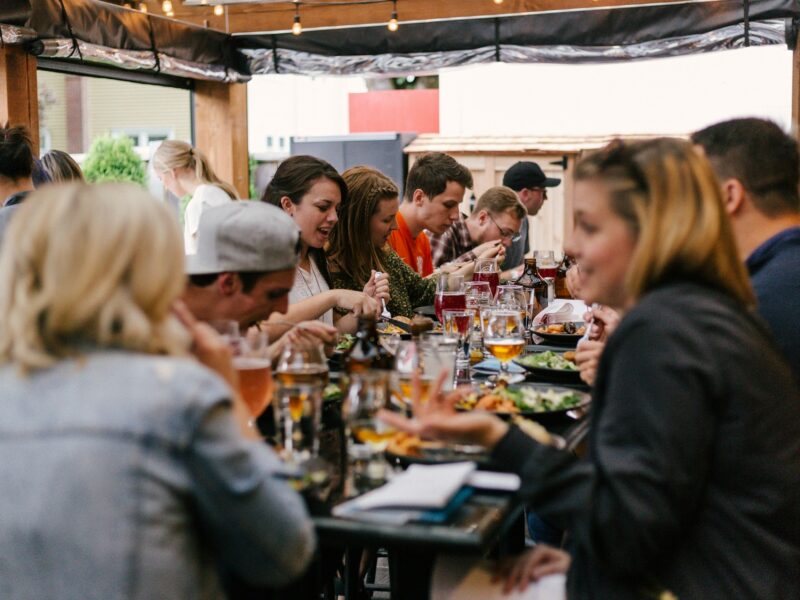Traveling offers an exciting opportunity to explore diverse culinary landscapes and experience local food cultures firsthand. Each destination provides unique flavors and dining experiences that reflect its history and traditions. From savoring a regional specialty to discovering a new favorite dish, food plays a crucial role in making travel memorable. Take, for instance, a visit to Hixson, Tennessee. Despite its small size, Hixson offers rich culinary experiences that showcase the essence of Southern hospitality. This charming town is known for its local eateries and community-centered dining, which present a taste of authentic regional cuisine.
Exploring Hixson’s food scene reveals how even modest locations can offer a wealth of culinary delights. The town’s eateries often highlight traditional Southern dishes, from classic BBQ to hearty comfort foods, reflecting the area’s unique flavors and cultural influences. By immersing in the local food culture, travelers gain a deeper appreciation for the area’s history and traditions. In this way, even a small town like Hixson can enhance a traveler’s culinary adventure, providing memorable experiences that highlight the richness of regional cuisine.
1) Exploring Local Delicacies
Traveling provides the opportunity to discover unique local delicacies unavailable elsewhere. For instance, a visit to Hixson, TN, reveals local culinary gems such as Buddy’s Bar-B-Q. This restaurant offers many BBQ options, including both dine-in and drive-thru services. Here, the focus is on slow-cooked BBQ that is served with efficiency, highlighting the art of slow cooking and fast service. Local eateries like Buddy’s introduce travelers to regional specialties, offering a taste of the local flavor that defines the area’s cuisine. It is one of the finest places to eat in Hixson for those looking to experience authentic Southern cuisine and enjoy a warm, welcoming atmosphere.
2) Diverse Culinary Experiences
One of the greatest benefits of traveling is the exposure to a variety of culinary styles and traditions. Each destination boasts its own culinary scene, from street food vendors offering quick bites to upscale restaurants presenting gourmet meals. This diversity allows travelers to experience a range of flavors and cooking techniques. Whether enjoying fresh seafood on a coastal trip or sampling traditional dishes in a historic city, the variety enhances one’s culinary repertoire and broadens one’s taste preferences.
3) Cultural Connection Through Food
Food plays a crucial role in understanding and connecting with different cultures. Every region’s cuisine reflects its history, traditions, and values. For example, exploring the local markets and eateries during travel can provide insights into the cultural practices and historical influences that shape a region’s food. This cultural connection through food not only enhances the travel experience but also fosters a deeper appreciation for the local way of life and heritage.
4) Learning New Cooking Techniques
Traveling often includes opportunities to learn new cooking techniques from local chefs and culinary experts. Many destinations offer cooking classes where travelers can gain hands-on experience with local recipes and cooking methods. These classes often cover traditional techniques and unique ingredients specific to the regioningredients specific to the region. By participating in these experiences, travelers can bring back new skills and recipes to incorporate into their own cooking routines, enriching their culinary abilities.
5) Experiencing Seasonal Ingredients
Each region has its own seasonal ingredients that define its culinary offerings. Traveling allows individuals to enjoy these fresh, seasonal ingredients at their peak. For example, a visit to a region during the harvest season might provide the chance to taste locally grown fruits, vegetables, and herbs integral to the local cuisine. Seasonal ingredients not only offer unique flavors but also provide a glimpse into the agricultural practices and food traditions of the area.
6) Meeting Local Chefs and Foodies
Engaging with local chefs and food enthusiasts during travel can provide invaluable insights into a region’s culinary landscape. Conversations with chefs often reveal hidden gems and favorite local dishes that may not be listed in tourist guides. Foodies, too, can offer recommendations based on their personal experiences and discoveries. These interactions enrich the travel experience by uncovering unique dining spots and authentic culinary experiences that might otherwise go unnoticed. Connecting with these local experts can lead to memorable meals and a deeper understanding of the area’s food culture.
7) Sampling Unique Food Pairings
Each region has its own distinctive food pairings and flavor combinations. Traveling introduces individuals to these unique pairings, ranging from classic regional dishes to inventive modern cuisine. For example, a visit to a coastal area might reveal unexpected combinations of seafood and tropical fruits, while a trip to a wine-producing region could offer innovative pairings of local wines with artisanal cheeses. Experiencing these one-of-a-kind flavor combinations not only excites the palate but also enhances one’s appreciation for the creativity and diversity of global cuisine.
8) Gaining Inspiration for Home Cooking
Exposure to diverse cuisines and cooking styles while traveling often sparks inspiration for home cooking. Sampling new dishes and witnessing different cooking techniques can motivate individuals to try new recipes and experiment with ingredients in their own kitchens. This inspiration leads to a richer cooking experience at home, where travelers can recreate some of their favorite dishes or adapt them to suit local ingredients. Bringing the flavors and techniques learned from travels into everyday cooking enriches one’s culinary repertoire and keeps meal preparation exciting.
9) Creating Culinary Memories
The food experiences encountered during travel often become cherished memories. Whether it’s a special meal shared with friends and family or a unique dish enjoyed at a local restaurant, these culinary experiences contribute to the overall travel narrative. Food has a way of evoking strong memories and emotions, making these experiences memorable and significant. Recalling the flavors, smells, and ambiance of a memorable meal can transport individuals back to that moment, reinforcing the connection between food and personal experiences.
10) Supporting Local Economies
Dining at local restaurants and markets during travel supports the local economy and contributes to the sustainability of the region. Choosing to eat at locally-owned establishments helps generate income for local farmers, chefs, and artisans. This economic support is crucial for maintaining the vibrancy of local food cultures and ensuring that traditional practices continue to thrive. By making conscious dining choices, travelers play a role in fostering the growth of local businesses and preserving the unique culinary traditions of the places they visit.
Conclusion
Traveling significantly enhances the culinary adventure by offering unique experiences that go beyond standard dining. Exploring local delicacies, sampling diverse cuisines, and engaging with the cultural and culinary practices of different regions enriches one’s understanding and appreciation of global food traditions. From learning new cooking techniques and discovering seasonal ingredients to creating lasting culinary memories and supporting local economies, each aspect of the journey contributes to a deeper connection with food. Embracing these opportunities during travel not only broadens one’s culinary horizons but also adds a meaningful and enjoyable dimension to the overall travel experience.
Want to unlock greater wellness?
Listen to our friends over at the Wellness + Wisdom Podcast to unlock your best self with Drew Canole of Organifi:








 The Impact of Instagram on Your Diet: Positive and Negative Aspects
The Impact of Instagram on Your Diet: Positive and Negative Aspects